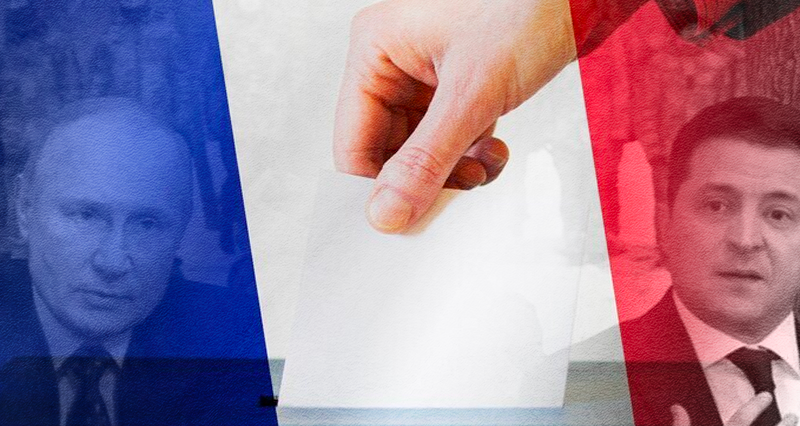By Ali Riza Tasdelen
The French presidential election is only three weeks away. The first round of the elections will be held on April 10th 2022. If any candidate fails to win an outright majority in the first round, the two candidates with the most votes will compete in the second round on April 24th.
To participate in the elections, the candidate must collect at least 500 signatures from officials such as the mayor, district council members, the congress members or senators. The Supreme Court of France announced that 12 candidates have met these requirements and would run for office.
An election without campaign
The candidates’ election campaigns, if we can even call that a campaign, have been heavily overshadowed by the Russo-Ukrainian crisis. All the election campaigns were used to focus mainly on the previous presidential five-year budget. The French public now, including the candidates, is talking about nothing but Ukraine all day long, especially with the heavy media influence over the public opinion. Currently the names of Ukrainian President Zelensky and Russian President Putin are mentioned more often in the news than those of the presidential candidates.
The media constantly debates the candidates’ view on Ukraine and Russia. President Macron’s “efforts to resolve the crisis” through diplomatic means, right before Russia has initiated its military operation in Ukraine, continuing dialogue with both Zelensky and Putin, while firmly advocating the US-imposed sanctions over Russia when the operation had begun, gave Macron a huge head start in this election. Macron is now running for the office with an image of “a leader who wants to stop the war on the doorsteps of Europe” rather than actually coming up with programs to solve France’s own domestic problems. Macron has refused to participate in the television debate with all candidates, taking place right before every election. The candidates direct some critics on Macron. They state that “an undemocratic election with no campaign will not be legitimate, regardless of the election outcomes and consequences”.
Macron is far ahead on polls
Macron, who announced his candidacy in the latest possible moment, is now leading polls with around 30 percent, far ahead of his closest rivals.
National Rally leader Marine Le Pen comes second with only 16 percent, Jean-Luc Melenchon third with 13 percent, Reconquete leader Eric Zemmour currently takes fourth place with 11 percent and former president Sarkozy’s party The Republicans’ candidate Valerie Pecresse gets fifth position with 10 percent. Others candidates combined make up of less than 6 percent.
Worth emphasizing: the candidate of the Socialist Party, Anne Hidalgo gets 3 percent of the votes according to polls, and the Communist Party of France candidate Fabien Roussel has 1 percent.
If the numbers stay as they are, it can be predicted that Macron and Le Pen will go for the second round. In that second round, Macron is expected to win the elections, as it happened in the last election.
Candidates and sanctions on Russia
The Republicans’ candidate Valerie Pecresse and Socialist Party candidate Anne Hidalgo are in favor of imposing sanctions on Russia, along with President Macron. Pecresse and Hidalgo even take a step further and advocate for even toughening the sanctions.
Melenchon, Le Pen and Zemmour on the other hand, think that the sanctions are not useful. They argue that it France that will suffer the most with these sanctions.
The Ukrainian refugees
All the candidates that usually have a xenophobic rhetoric on immigrants and refugees are fully welcoming refugees when it they are from Ukraine. Those candidates that do not have a xenophobic discourse, that is Melenchon and The Communist Party of France Candidate and the Greens (EELV) candidate Roussel also open doors.
The only candidate that insists on a xenophobic position is Zemmour, who proposes that Ukrainian refugees should go to Poland instead of France.
Military aid to Ukraine
Most of the candidates agree on rejecting to send French troops to Ukraine. Especially the candidates of The Republicans, Socialist Party and The Greens are in favor of supplying arms and military equipment. The Communist Party of France candidate states, “We should put pressure on Putin, mediate a ceasefire and all Russian troops must withdraw from Ukraine”. Melenchon states “This war has already been lost on the ground”, while Zemmour suggests the contrary by saying “Putin is the final culprit, while NATO is the responsible for this war when trying to expand more and more”.
The stance against NATO
All candidates have different stances when it comes to NATO. The only candidate advocating for stronger ties with NATO is Hidalgo, the Socialist Party candidate.
Jean-Luc Melenchon, Fabien Roussel, Eric Zemmour and Marine Le Pen all advocate that France should leave NATO’s military wing. But there are only two candidates that declare this position in their official programs: Jean-Luc Melenchon and Fabien Roussel. Macron and Valerie Pecresse on the other hand advocate an “Autonomous European Defense”, but they say this cannot happen without the NATO.
Political and economic incapability
When we look at the political programs of the top 5 candidates, Melenchon and Roussel’s economic, social and immigrant-related programs are more moderate. Others, and especially the most xenophobic candidate Zemmour, all have programs that promote national security first and racist policies against the rights of other nationalities living in France.
Like most of the other European countries, France is politically collapsing. They do not have the right programs or the leaders to get out of the current political and economic crisis. This is only distancing the French public from their politicians. This probably will be reflected with a low voter turnout in the elections eventually.

















Leave a Reply